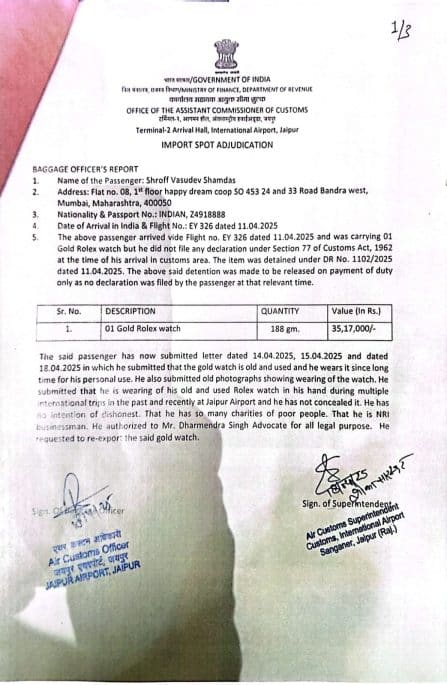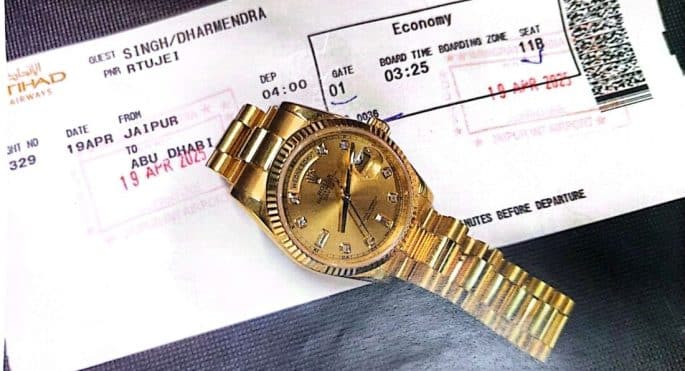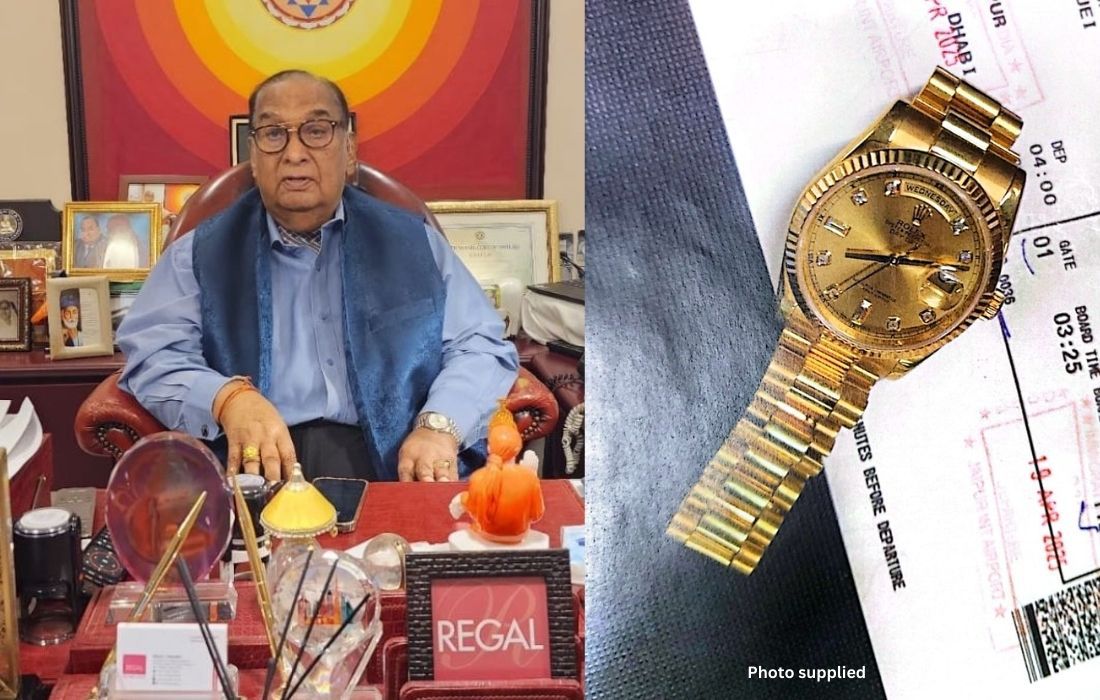84-year-old wheelchair-bound UAE businessman, Vasu Shroff detained by Indian customs despite declaring a 10-year-old wristwatch with proper documents.
Dubai/ Jaipur: In a deeply troubling incident that has sparked widespread concern, renowned Dubai-based Indian expat Vasu Shroff, Chairman of the Regal Group and recipient of the prestigious Pravasi Bharatiya Samman, was harassed and detained by customs officials at Jaipur International Airport on April 11. The 84-year-old non-resident Indian (NRI) was held for over four hours in his wheelchair—without access to water, medicine, or basic facilities—for carrying a personal wristwatch that he had voluntarily declared.
The incident occurred when Vasu Shroff, who had travelled to Jaipur for a family event and a temple inauguration in Sikar, was stopped by customs officers while exiting the airport. Despite wearing the watch openly and informing officials that it was a personal item he would return with, he was accused of concealing and smuggling it.
“I was treated like a criminal!” – Vasu Shroff
Speaking to The Brew News, Vasu Shroff recounted the ordeal:
“I told them clearly that I had a watch, showed them the original receipt and certificate, and mentioned that I would take it back with me on April 14. But I was treated like a criminal. I was held without my medication or even a glass of water. Is this how India treats its elderly citizens?”
To make matters worse, customs officials reportedly valued the 10-year-old wristwatch at INR 3.5 million (AED 151,237), and demanded a customs duty of 39% on the assessed value. Despite his condition and clean travel record—Shroff has visited India over 100 times—he was subjected to repeated questioning, multiple luggage checks, and prolonged detention.

The treatment of Shroff stands in direct contradiction to a recent ruling by the Delhi High Court, which clearly stated that personal jewellery or inherited items worn by passengers should not be seized or questioned without specific cause. The court had examined over 30 similar cases of NRI harassment and concluded that customs officials must not act arbitrarily or harass returning Indians without valid grounds.

Due to the stress and lack of medication, Vasu Shroff’s health began to deteriorate during the ordeal. In order to exit the airport and attend to his condition, he left the watch behind with customs and obtained a receipt. Unfortunately, this also caused him to miss the family function he had travelled for.
“I’ve been living in Dubai for over 60 years and have always felt proud to visit my homeland. But the way I was treated in Jaipur made me feel like I was being punished for no reason. It felt like a slaughterhouse, not an airport,” said Shroff, visibly shaken by the incident.
His lawyer, Dharmendra Singh, met with customs authorities the next day and appealed on humanitarian grounds, stressing Shroff’s stature, contribution to Indian society, and the clear absence of intent to smuggle. Singh offered to pay the duty if required, but was made to wait two additional days before officials finally agreed to release the watch upon payment of a INR 10,000 penalty.
“If he had wanted to smuggle, why would he go to declare the item himself? It makes no sense. He was wearing the watch openly and it had been scanned multiple times,” Singh pointed out.
On 19th April, Singh collected the watch from customs and handed it back to Shroff in Dubai.

The incident has reignited the debate over the treatment of NRIs at Indian airports, especially those who contribute significantly to India’s global image and economy. Shroff has now announced that he will pursue legal action to ensure no other Indian faces similar humiliation and distress in the future.
Fellow businessman Suresh Gilani expressed his dismay: “The government urges us to invest in India, build businesses, support causes—but when we visit, we’re treated like suspects. This is unacceptable and inhuman.”
The episode has raised pressing questions around customs transparency, the need for better training of officials, and ensuring basic dignity for elderly passengers, especially those in wheelchairs or with medical conditions.
As India positions itself as a global destination for investment and tourism, the mistreatment of respected citizens like Vasu Shroff sends the wrong message—not just to the Indian diaspora, but to the world.
About Vasu Shroff:
Known as Dubai’s textile king, Vasu Shroff arrived in the UAE as a 19-year-old in 1960 and built a business empire from a single trading store. Today, his multi-billion dollar holding company oversees ventures across distribution, real estate, manufacturing, technology, and finance, with flagship firms like Regal Traders, Regal International, Regal Technologies, and Regal Group of Investments. Regal Traders, the group’s textile core, runs 12 branches across Dubai, Abu Dhabi, and Ras Al Khaimah, making Shroff a key figure in the region’s fabric trade. Beyond business, Shroff is also a committed philanthropist, supporting causes in education, healthcare, and community development, and is currently on a mission to build 101 temples globally.


















